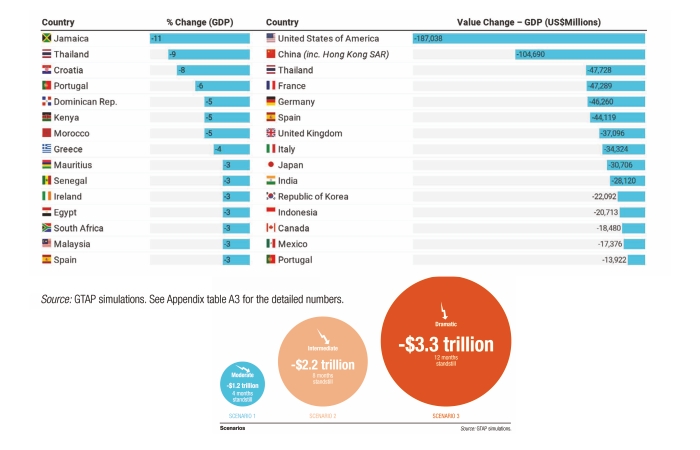According to United Nations Conference on Trade and Development (UNCTAD), decline in tourist arrivals will affect employment and income along the entire supply chain. The GDP and employment effects are, therefore, much greater than inbound tourist expenditure data would suggest and especially true for countries that depend heavily on tourism.
The COVID-19 pandemic has caused significant disruptions in the global economy. Tourism is a critical sector of the international economy. In 2019, the tourism sector accounted for 29 per cent of the world’s services exports and about 300 million jobs globally. It is an important source of income and employment for developed and developing countries. The global contraction in tourism arrivals could have devastating economic consequences as some developing countries are highly dependent on tourism.
Global macroeconomic losses
Taking into account the subsectors that support the tourism industry, the incurred loss to GDP is much larger than the direct effects of the loss of tourism. Global GDP losses under the most optimistic tourism reduction scenario amount to an estimated $1.17 trillion, about 1.5 per cent of global GDP. Extending the four months lockdown to eight and 12 months increases the losses in a fairly linear fashion, to $2.22 trillion (2.8% of world’s GDP) and $3.3 trillion (4.2% of world’s GDP), respectively. The estimated GDP losses of $3.3 trillion are more than double the size of the international tourism industry alone in the worst-case scenario.
GDP losses by country
The GDP losses by country are varied. The losses are largely determined by the size of the tourism industry relative to GDP. This is also partly dependent upon the inter-sectoral linkages of supply in the tourism industry and the ability of a country to shift from tourism to other industries. In absolute terms, the world’s largest trading economies, USA and China face the largest declines in GDP. The USA incurs the highest losses with a drop of $187 billion in GDP in the moderate scenario. Following the US, China faces a loss of $104 billion in GDP. Major tourist destinations such as Thailand, France and Germany stand to lose approximately $47 billion each in GDP due to the
contraction in tourism. India stands at a loss of approximately $28 billion.
Conclusion
Using the general equilibrium model, the potential effects of the tourism shock can be quantified. A decline in tourist arrivals affects employment and income along the supply chain. Therefore, the GDP and employment effects are much greater than the inbound tourist expenditure data would suggest. Many countries depend heavily on tourism and will experience dramatic effects in the labour market and national income. Loss of employment in the unskilled sector is above 10 per cent in many countries even in the most optimistic (moderate) scenario and can rise above 40 per cent in the most pessimistic (dramatic) scenario. Women are likely to be disproportionately affected due to a high share of female employment in the tourism sector. However, almost all sectors of the economies reliant on tourism are negatively affected due to the inter-sectoral linkages.
 TravTalk India Online Magazine
TravTalk India Online Magazine





